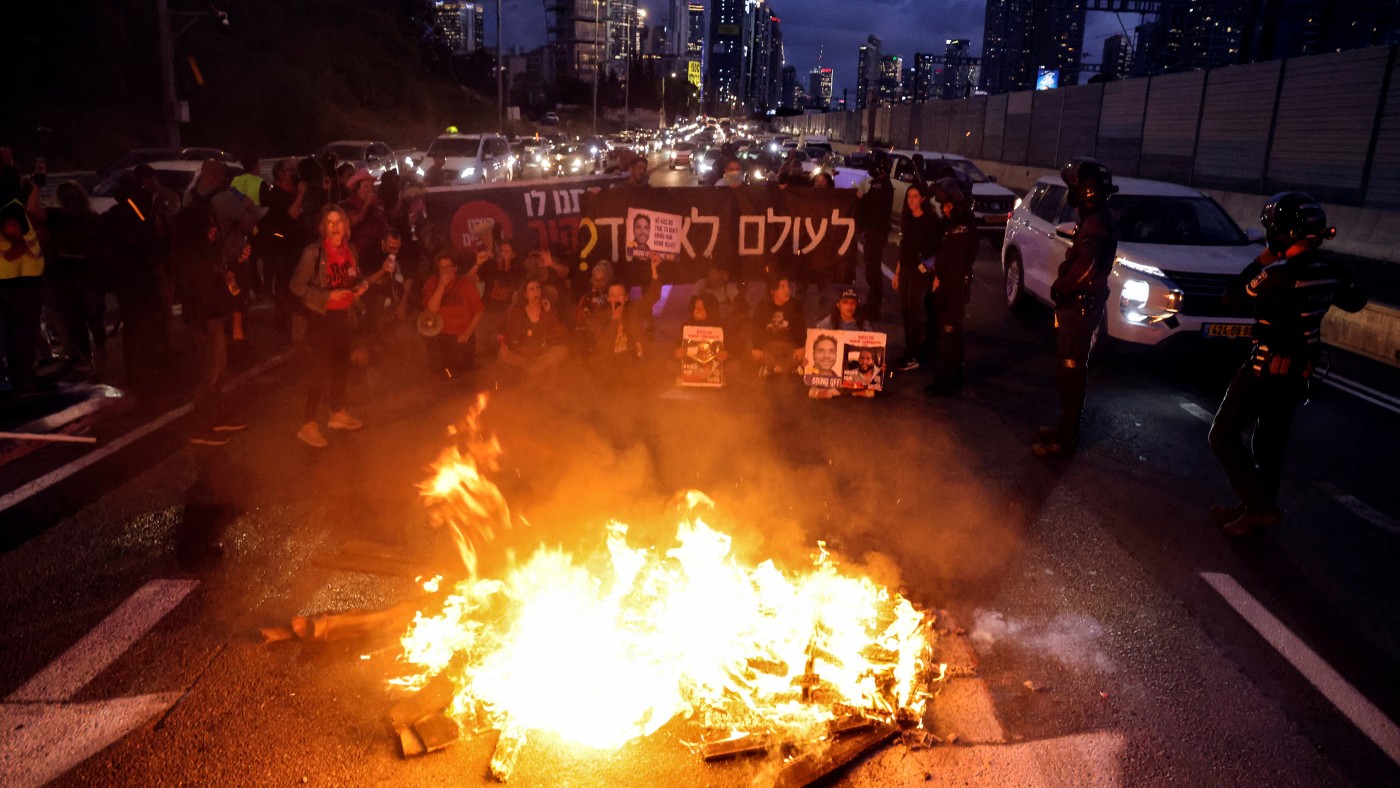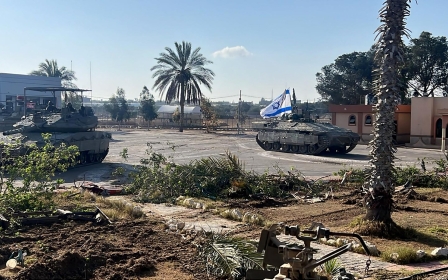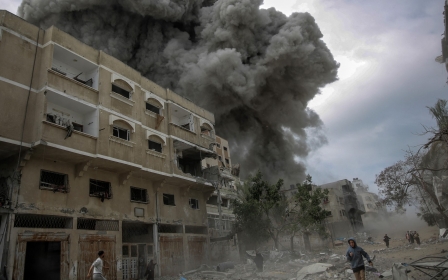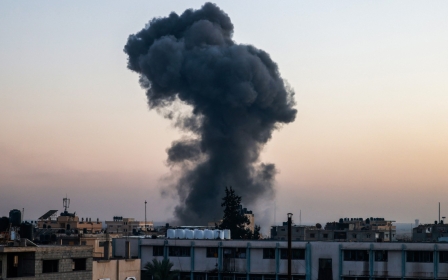Gaza ceasefire: Israel faces fury from captives' families over stalling on deal with Hamas
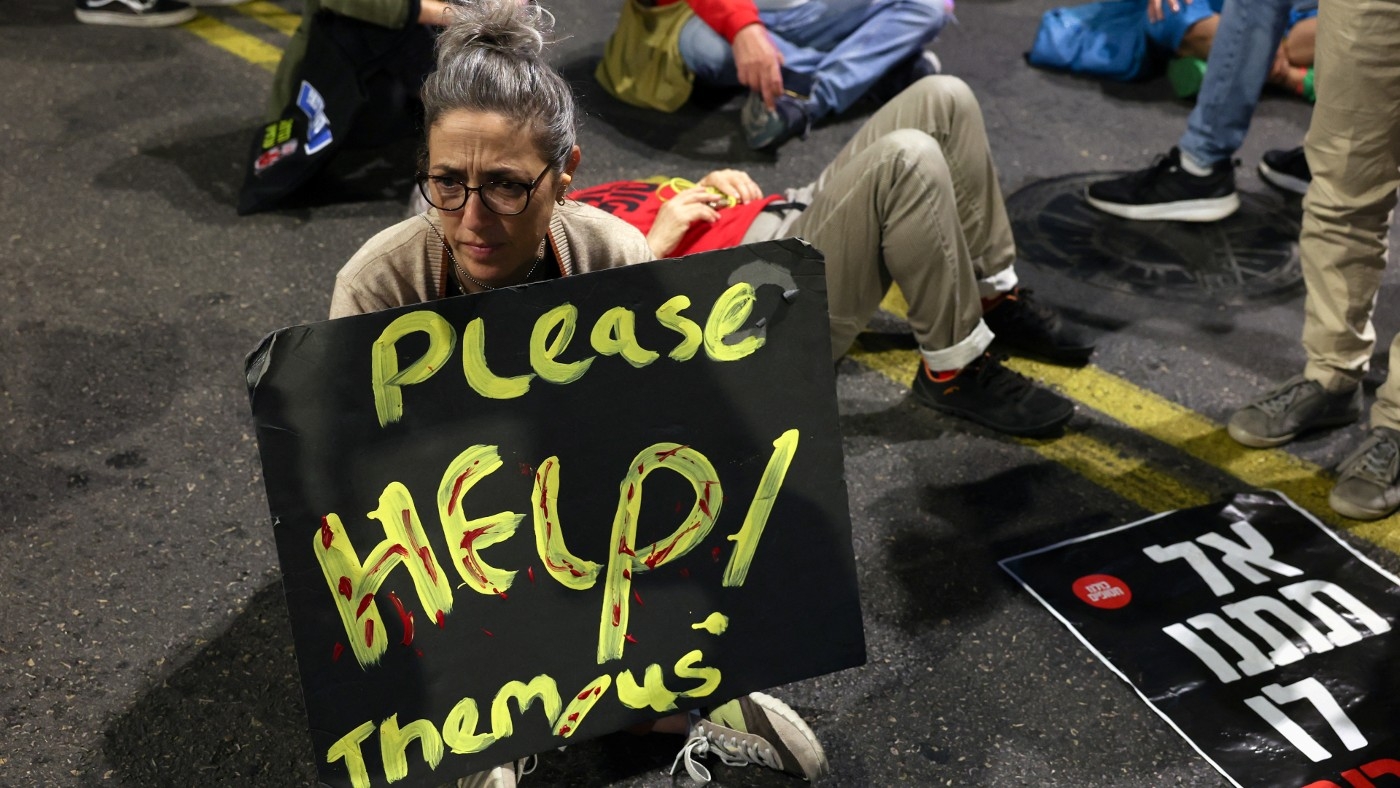
The Israeli government is coming under increasing pressure from the families of those taken captive by Hamas to end the war in Gaza and bring their loved ones home, as thousands of people took to the streets across the country last night.
At a sweeping set of protests in Tel Aviv, which saw demonstrators clash with police, the families of captives spoke out against the Israeli government's position.
Standing on top of a vehicle in the middle of a crowd of protesters on the Ayalon highway, a loudspeaker in her hand, Einav Zangauker, whose 24-year-old son Matan is being held in Gaza, addressed the government:
“It’s time to accept the deal. It’s time for a ceasefire. We’ll not let you miss the opportunity. We’re not going to let you continue abandoning our children… Bring them back home.”
The Israeli mother went on to say: “Hamas has agreed to the deal. Now is the time for the Netanyahu government to return the hostages. Otherwise, we will burn the country."
New MEE newsletter: Jerusalem Dispatch
Sign up to get the latest insights and analysis on Israel-Palestine, alongside Turkey Unpacked and other MEE newsletters
In Jerusalem, over 100 demonstrators marched towards the residence of Israeli Prime Minister Benjamin Netanyahu with a banner saying: “The blood is on your hands.”
On Monday night Hamas agreed to a US-mediated ceasefire proposal. Netanyahu's office said that while it was “far from meeting Israel’s core demands, Israel will dispatch a ranking delegation to Egypt in an effort to maximize the possibility of reaching an agreement on terms acceptable to Israel.”
Israel has invaded Rafah, the city in southern Gaza that sits on the border with Egypt, seizing the key border crossing there. It has been bombing the densely crowded area ever since.
Netanyahu and his war cabinet say the proposal agreed to by Hamas differs from one seen by Israel.
Two US officials told the New York Times that “minor wording changes” had been made to the proposal agreed to by Hamas, and that these were made by Arab mediators in consultation with CIA director William Burns, who has been the main US representative in the negotiations.
The deal calls for a phased release of all Israeli captives in exchange for Palestinian prisoners.
Israel estimates that 128 of the 250 captives kidnapped to Gaza in October remain there, including 35 who the military says are dead.
Rage against the Israeli government
The rage of the captives’ families comes as evidence of growing US frustration with Israel emerges.
On Monday, a US official told Reuters that "Netanyahu and the war cabinet have not appeared to approach the latest phase of negotiations (with Hamas) in good faith."
A senior US official told Axios: “American diplomats have been engaged with Israeli counterparts. There have been no surprises."
White House spokesperson John Kirby said: “We want to get these hostages out, we want to get a ceasefire in place for six weeks, we want to increase humanitarian assistance,” adding that reaching an agreement would be the “absolute best outcome”.
Monday night's protests were held in Israeli cities including Haifa and Tel Aviv.
The evening marked the end of Holocaust Remembrance Day in Israel, and the families of the captives, along with other protesters, held up signs that said, “Never again.”
They blocked the Ayalon highway and burned an hourglass to represent the Israeli government “burning the time of the abductees in the captivity of Hamas”.
'Now is the time for the Netanyahu government to return the hostages. Otherwise, we will burn the country'
- Einav Zangauker, mother of captive held in Gaza
According to Israel’s Channel 12 News, demonstrators walked between cars on the road and clashed with police, resulting in three arrests.
The police handed out fines to protesters blocking the Ayalon road, with one saying: “If I need to pay a 500 shekel fine to release the abductees, then I am ready to accept another 1,000 fines.”
Yifat Zeiler, whose cousin, Shiri Bibas, was abducted with her two young children, Ariel, then aged four and Kfir, then aged nine months, said at the protest: “Enough. I want my family.”
Gil Dikman, whose cousin Carmel Gat is being held in Gaza, addressed Netanyahu’s government: “The abductees are in your hands. If you don’t accept the deal, tonight will be the night of the abductees. We will not sleep.”
In a statement, the Hostages and Missing Families Forum, which represents the families of captives held in Gaza, welcomed Hamas’s acceptance of the ceasefire deal and called on the Israeli government to “prove in practice its commitment to its citizens”.
'Netanyahu is finished'
Ehud Yaari, an Israeli analyst with knowledge of the ongoing negotiations, said that Netanyahu was "finished". He told Middle East Eye that the Israeli prime minister would be removed by huge protests - which have not yet materialised - or by elections in September or October.
"There is not yet a clear path to end his tenure in office and he will do whatever he can to stay in power," Yaari said. He said, though, that the decision to invade Rafah was one that everyone in Israel's war cabinet agreed on, not just Netanyahu.
"It is still the Israeli military's goal to get rid of Hamas," Yaari said. "To make room for another government system in Gaza, you need to drive them as deep underground as possible."
Middle East Eye delivers independent and unrivalled coverage and analysis of the Middle East, North Africa and beyond. To learn more about republishing this content and the associated fees, please fill out this form. More about MEE can be found here.


